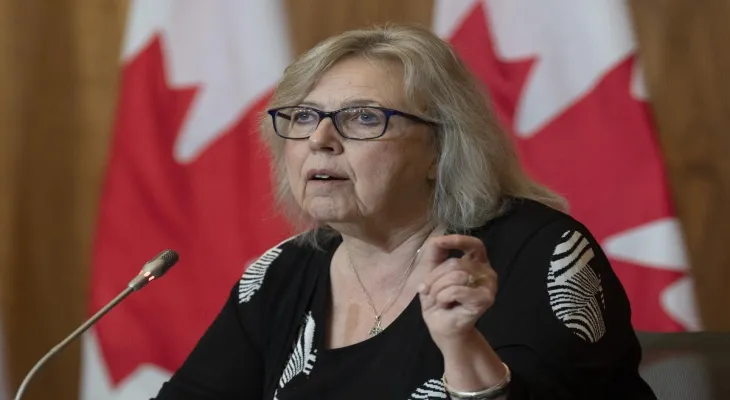Search here
Newspaper
Search here

Arab Canada News
News

Published: January 19, 2024
Federal Green Party leader Elizabeth May announced her support for the hunger strike demanding Canada impose an arms embargo on Israel.
In an email to the Star newspaper, May confirmed that she is participating in the hunger strike for just one day "in solidarity with the people starving in Gaza."
May said: "The whole thing is very painful." "I can't sleep while thinking about getting the hostages (held by Israel) to a safe place, with the chances diminishing as days pass, delivering humanitarian aid to Gaza, and getting civilians to safety, which requires a ceasefire through negotiation."
May was joined by New Democratic Party MP Nikki Ashton and more than 250 people across Canada who started a hunger strike on Thursday; since the campaign began a few weeks ago, 1100 Canadians have completed or registered for the hunger strike, according to the organization "Gaza is Starving."
In a prerecorded video at a press conference in Toronto on Thursday morning, Ashton referred to the war in Gaza as a "genocide" and a "new Nakba," referring to the mass displacement of Palestinians at the founding of Israel.
Ashton said: "Canada has given political cover to Israel by refusing calls for a ceasefire for several months." "Canada continues to provide military support to Israel... weapons used to kill Palestinians."
Ashton said in a video that she is participating in the hunger strike, which was confirmed by a spokesperson for the federal New Democratic Party.
More than 24,000 Palestinians have been killed since Israel began bombing the Gaza Strip, two-thirds of them women and children, according to the health ministry in the Hamas-controlled territory. Israel has destroyed about half of the buildings in Gaza, displaced about 85% of the territory’s 2.3 million residents, and pushed a quarter of the population to starvation, according to the United Nations.
Israel ordered a "complete siege" on Gaza, barring food, fuel, or electricity, following a Hamas attack on Israel on October 7, which killed about 1,200 people that day, mostly civilians, and took an estimated 240 hostages, with more than 100 still in Hamas captivity.
The United Nations said this week that aid entry has since been allowed but not enough to meet the needs of Gaza’s residents.
Heads of UN agencies said the delivery of aid has been hampered by Israel’s slow inspection process of trucks and goods entering Gaza.
United Nations Secretary-General Antonio Guterres said the UN and its partners "cannot effectively deliver humanitarian aid while Gaza is under such heavy, widespread, and continuous bombardment."
Following the Hamas attack, many Western countries, including Canada, affirmed Israel’s right to self-defense. As the death toll in Gaza rose, calls for restraint increased, and in December, Canada voted in favor of a UN resolution calling for a ceasefire.
In recent months, pro-Palestinian protesters have staged sit-ins at several companies they say help Israeli war efforts, including Scotiabank, which invests in the controversial Israeli weapons manufacturer Elbit Systems Limited, the manufacturing plant in Mississauga of the American aerospace company Pratt & Whitney, and ZIM Integrated Shipping Services.
According to the latest government statistics submitted to Parliament, Canada exported $21.3 million worth of "military goods and technology" to Israel in 2022.
Ashton said, "The sad truth is that Canada used to be a leader when it came to peacekeeping around the world, including in the Middle East." "Now, we are leaders when it comes to arms trade."
Michael Fakhri, the UN Special Rapporteur on the Right to Food, described the "unprecedented humanitarian crisis" in Gaza to attendees at the conference via video call.
He said, "Everybody in Gaza is suffering from hunger now; they are struggling to find food and drinkable water, famine is imminent," confirming that "80% of the world’s population facing famine or 'catastrophic hunger' are in Gaza."
For Human Rights Watch, this deprivation, which it says Israel is "deliberately blocking the delivery of water, food, and fuel," constitutes a war crime.
Even before Israel imposed a siege on Gaza in October, food access to the territory was a grave concern, with a 2021 study finding that more than 70 percent of Gaza’s population suffered from food insecurity.
Before the war, about 500 aid trucks entered Gaza daily, carrying food, water, fuel, medicine, construction materials, and clothing.
Israel imposed a blockade on the territory in 2007 after Hamas violently took over Gaza from the internationally recognized Palestinian Authority forces, and Israeli measures, along with restrictions imposed by neighboring Egypt, have severely restricted the movement of people and goods in and out of the territory. These have cost Gaza up to $16.7 billion in economic losses and caused rising poverty and unemployment rates, the UN reported in 2020.
Israel said the restrictions are necessary to prevent Hamas from building its military capabilities. Tens of thousands of rockets have been launched from Gaza toward Israeli cities in recent years, including on October 7 and since then.
Organizers say there is no mandatory duration for the hunger strike; some participants chose to go without food for one or two days a week, and organizers said one person has been on strike for more than 30 consecutive days.
Nadine Nasser, a Palestinian Canadian organizer working with "Gaza is Starving," said, "None of us want to be on a hunger strike. I work full-time. I have two kids. I am exhausted and sad."
She said they have resorted to her out of desperation, "I wake up every morning to see who else died while I was sleeping.. All we ask for is peace, why doesn't our government listen?"
Comments